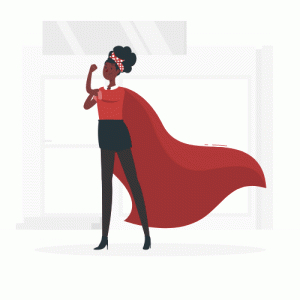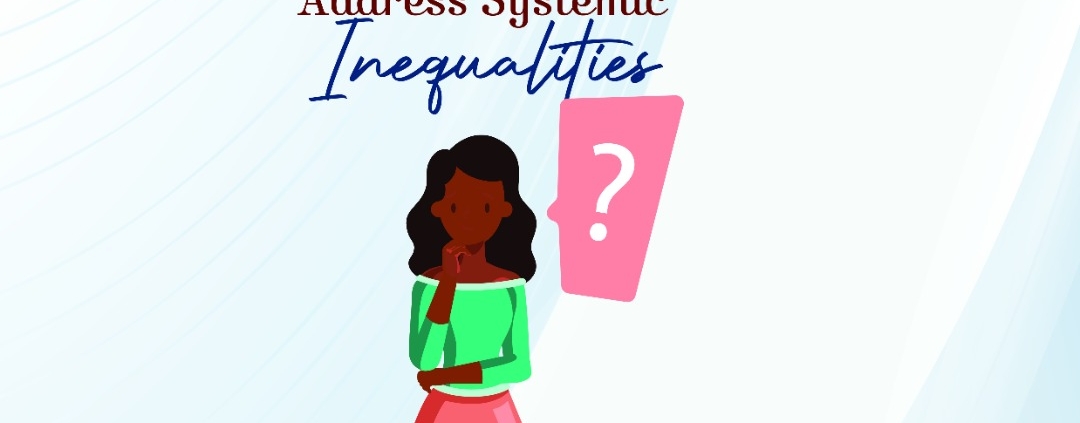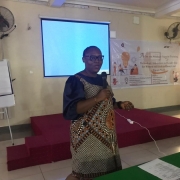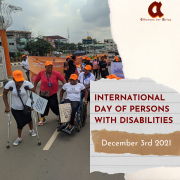What are Systemic Inequalities?
……. How Can We Address it?
Systemic Inequalities are specific policies, standards, and practices, as well as attitudes and prejudices combined to create institutionalized and even structural problems of inequality in the society in the society; work places, schools, religious institutions, politics, etc.
Patriarchy and male superiority narratives are underlying causes of systemic inequalities. Intentional or not the African culture has been taught that male gender is superior to females. Over time, systems and modern-day policies are adopting this wrong ideal into workplaces, schools, religious institutions and political spheres. To tackle institutionalized inequality, we need to unlearn old norms and practices and shift towards a safer and fair playing ground for all genders. It also manifests itself in the health care system, education system, unequal pay and employment ratio.
In simple terms, systemic inequality only empowers a man but takes away same power from a woman.
Factors Promoting Systemic Inequalities
- Ignorance/Stereotypes
- Mindset/Ego
- Misinterpretations of traditional & religious perspectives
- Women’s poor representation in leadership spaces to adequately articulate women’s issues.
- Unequal power relationships
- Unequal treatments at home, marginalization (family influence)
- Foreign non – indigenous religions
- Illiteracy
- Bad orientation
- Women’s lack of support for each other
- Culture, custom and norms
- Beliefs that men are superior to women.
- Fear
Manifestations of Systemic Inequality
When AfA engaged stakeholders in Anambra, Enugu and Ebonyi the following were various ways listed as means systemic inequality manifests itself:
- Self- Imposed – policies by women against themselves.
- Inheritance – Women and girls are deprived rights of inheritance
- Lawyers – Clients don’t have confidence in women lawyers
- Immigration – Women are deprived from getting passport service for their children without the father’s consent or presence, but allow men same privileges without their wives.
- Some policies on marriage are unfriendly for women
- Females in politics are labelled prostitutes and are not supported to vie for political positions same goes for Student Union Government in higher institutions where presidency positions are exclusively reserved for males alone.
- Some families do not support female daughters
- Chieftaincy title is not given to women in most localities.
- Training of male in preferences to the female
- It is against women to have a share of the property of the father.
- Choice of male to female child during delivery
- Women cannot be royal highnesses
- Family upbringing come with certain stereotypes due to unclear gender roles.
- Male spouses do not support their wives in attaining milestones in their career.
How Can We address Systemic Inequalities?
Addressing systemic inequality requires an all-inclusive, hands-on deck citizens approach. It should first start from changing the narrative that women are second class citizens and recognizing that women’s rights are fundamental human rights.
It also involves changing social norms, attitudes and beliefs concerning the role of women in society, and internalizing the need to empower women to live free from violence and discrimination, participate in decision making, and exercise their full economic rights, and full bodily autonomy to productively contribute to nation building. Women’s rights and systemic equality when promoted and protected, have far-reaching, positive ripple effect in the society.
Role of citizens
- Citizens must internalize the need to change social norms, attitudes and beliefs concerning the role of women in the family, in the workplace and in the society.
- Citizens must stand together and take action for justice, peace and equity.
- Youths must confront and condemn discrimination, exclusion and marginalization of women in politics/leadership positions especially as it is prevalent in higher institutions where certain student union elective positions are exclusively reserved for male students
- Male spouses must understand the need to support their wives to attain any milestone they wish for in their career or work life.
- Citizens must be at the fore of petitions and political engagements that promotes women right movement.
- Citizens must support diversity, equity and inclusion of women in political and elective positions without labelling and name calling.
- They must advocate for full implementation and enforcement of all legal frameworks and policies
Role of Women
- Local women organization’s bye law should be robust and comprehensive enough to dismantle norms, stereotypes and policies imposed on them and those they impose on themselves.
- Annual August meetings should become a forum to address certain gender norms and stereotypes and build alliance to promote gender equality.
- Women must work together in love and amplify voices against inequality
- Women must learn to promote women agenda constructively.
- Women should learn to raise boys as change agents in the home and work at stopping gender stereotypes and unclear gender roles in families.
Role of Government
- The government must domesticate, implement, and enforce legal instruments on Violence against Women into local laws
- Review and revise long-standing practices and policies to ensure all individuals are treated equally.
- There is need for government to enact policies that ensures equitable solutions and equal access to opportunities and embed fairness, inclusivity in decision-making processes in all government parastatals.
- The government must address workplace inequality in MDAs, Military and Paramilitary that deprive women same opportunity due to them, yet give same to their male counter parts.
- Government must play a role in providing at least one shelter in every state of the nation to protect survivors from further violence.
- The government should build capacity of the law enforcement agents’, social welfare and judiciary officials to effectively, handle cases of Sexual and Gender based violence and also provide support and counseling to women survivors of violence.
- The political terrain should be restructured to ensure the security and safety of women politicians to contest for elective posts.
Role of Community/ Society
- Many current inequities are sustained by historical legacies, structures and systems that repeat patterns of exclusion most often entrenched in patriarchy. Such extant laws should be reviewed.
- Dismantling the cultural beliefs that women’s role are exclusive domestic affairs thereby denying them opportunity to assume leadership roles and other societal activities such as accepting chieftaincy titles, cabinet membership.
- Abolishing certain norms deeply rooted in culture that inhibits women’s right of place in the community like sonship preferences, gender stereotyping.
- Enacting laws prohibiting inhuman and degrading treatment of women and other harmful widowhood practices and publicly denouncing same.
- Putting a stop to policies on marriage that are not favorable to women
- Treat rape and defilement cases as criminal offences and discourage all forms Alternative Dispute Resolutions on such cases.
“Advocate to Change the Narrative; Addressing Systemic inequalities equates promoting gender Equality!”











Leave a Reply
Want to join the discussion?Feel free to contribute!